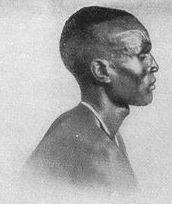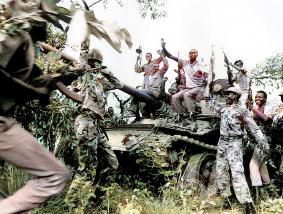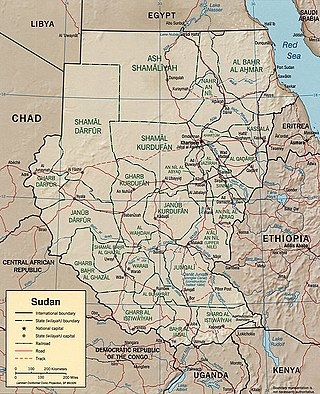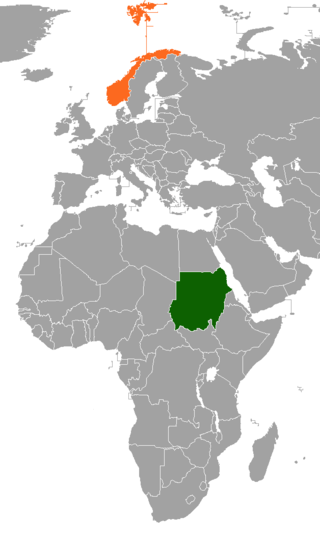The 2019 transitional constitution of Sudan guarantees freedom of religion and omits reference to sharia as a source of law, unlike the 2005 constitution of Sudan's deposed president Omar al-Bashir whose government had criminalized apostasy and blasphemy against Islam. Bashir's government had also targeted Shia Muslims and those engaging in proselytization to faiths other than Islam. Christians had also faced restrictions in matters of religious freedom.

Darfur is a region of western Sudan. Dār is an Arabic word meaning "home [of]" – the region was named Dardaju while ruled by the Daju, who migrated from Meroë c. 350 AD, and it was renamed Dartunjur when the Tunjur ruled the area. Darfur was an independent sultanate for several hundred years until 1874, when it fell to the Sudanese warlord Rabih az-Zubayr. The region was later invaded and incorporated into Sudan by Anglo-Egyptian forces in 1916. As an administrative region, Darfur is divided into five federal states: Central Darfur, East Darfur, North Darfur, South Darfur and West Darfur. Because of the War in Darfur between Sudanese government forces and the indigenous population, the region has been in a state of humanitarian emergency and genocide since 2003. The factors include religious and ethnic rivalry, and the rivalry between farmers and herders.

The Dinka people are a Nilotic ethnic group native to South Sudan. The Dinka mostly live along the Nile, from Mangalla-Bor to Renk, in the region of Bahr el Ghazal, Upper Nile, and the Abyei Area of the Ngok Dinka in South Sudan.

The Second Sudanese Civil War was a conflict from 1983 to 2005 between the central Sudanese government and the Sudan People's Liberation Army. It was largely a continuation of the First Sudanese Civil War of 1955 to 1972. Although it originated in southern Sudan, the civil war spread to the Nuba mountains and the Blue Nile. It lasted for almost 22 years and is one of the longest civil wars on record. The war resulted in the independence of South Sudan 6 years after the war ended.

Operation Lifeline Sudan (OLS) was a consortium of United Nations agencies and approximately 35 non-governmental organizations operating in southern Sudan to provide humanitarian assistance throughout war-torn and drought-afflicted regions in the South. Operation Lifeline Sudan was established in April 1989 in response to a devastating war-induced famine and other humanitarian consequences of the Second Sudanese Civil War between the Sudanese government and South Sudanese rebels. It was the result of negotiations between the UN, the Government of Sudan and the Sudan People's Liberation Movement/Army (SPLM/A) to deliver humanitarian assistance to all civilians in need, regardless of their location or political affiliation. This included over 100,000 returnees from Itang in Ethiopia in 1991. Lokichogio was the primary forward operations hub for OLS.

The Lost Boys of Sudan refers to a group of over 20,000 boys of the Nuer and Dinka ethnic groups who were displaced or orphaned during the Second Sudanese Civil War (1987–2005). Two million were killed and others were severely affected by the conflict. The term was used by healthcare workers in the refugee camps and may have been derived from the children's story of Peter Pan by J. M. Barrie. The term was also extended to refer to children who fled the post-independence violence in South Sudan in 2011–2013.

The Journey of the Lost Boys (2005) is a non-fiction book by Joan Hecht about The Lost Boys of Sudan. "The Lost Boys" are a group of young children who became separated from their parents due to civil war in their homeland. With little food and water and no protection from wild animals and enemy soldiers that stalked them night and day, these children banded together walking over a thousand miles across the wilds of Africa in search of safe refuge.
Joan Hecht is an American humanitarian and award winning author of the book The Journey of the Lost Boys. She is also the founder and President of the 501 c-3 non-profit Alliance for the Lost Boys of Sudan, an organization that assists with the health and educational needs of Lost Boys and their families living in the United States and Africa. Hecht formerly traveled as a back-up singer for The Johnny Van Zant Band and began recording professionally at age 14. However, she is best known for her work related to the Lost Boys of Sudan, including engaging in public speaking on their behalf and that of the people of South Sudan, as well as writing an award winning book about them titled, "The Journey of the Lost Boys".
The Breidjing refugee camp is a camp located in eastern Chad created by the UNHCR and run by the Red Cross, which eventually hosted around 42,000 Sudanese refugees who fled Darfur, Sudan in 2004 after the start of a long armed conflict. This camp is still operating as of 2018.
The Sudanese Red Crescent (SRC) is the biggest and most decentralized and widespread humanitarian organization operating in Sudan. The society developed out of the Sudan branch of the British Red Cross Society and was established in 1956. Upon Sudan's independence in March 1956 received official recognition as an independent National Society following the Sudanese Council of Ministers decree No. 869. The National Society covers nearly the entire country with 15 State branches and several sub-branches/units in the provinces/localities and administrative units, with a nationwide community-based network of 35,000 active volunteers and another 300,000 who can be deployed as need arises. It has well-established working relations with public authorities at federal, state and local levels, and good partnership and collaboration with Movement partners and UN specialized agencies and national and international NGOs working in Sudan.
Sudan Sunrise, Inc. is an American nonprofit 501(c)(3) organization based out of Fairfax, Virginia. According to their mission statement, Sudan Sunrise strives for grassroots reconciliation, education and community building in order to lift up examples of peace and forgiveness between former enemies as alternatives to the history of violence in Sudan and South Sudan. Sudan Sunrise also facilitates local efforts in Southern Sudan to provide education, health care and community development.
Water for South Sudan is an American nonprofit 501(c)(3) corporation founded in 2003 to drill wells, deliver hygiene education, and provide sanitation services to South Sudan.

Sudan–United Kingdom relations are foreign relations between Sudan and the United Kingdom. Sudan has an embassy in London whilst the United Kingdom has an embassy in Khartoum. Most of the recent relations between the two countries centre on the region of Darfur.

Norway – Sudan relations are international relations between Norway and Sudan.

United States aid to Sudan has three key objectives: a definitive end to conflict, gross human rights abuses, and genocide in Darfur; implementation of the north–south Comprehensive Peace Agreement that results in a peaceful post-2011 Sudan, or an orderly path toward two separate and viable states at peace with each other; and ensuring that Sudan does not provide a safe haven for international terrorists. Sudan has experienced two civil wars since 1955, the second of which lasted 22 years. During this time, the U.S. was the largest provider of foreign aid to Sudan, largely focused on humanitarian aid through the U.S. Agency for International Development. Sudan is listed as the U.S. government's highest priority in Africa due to "its importance for counter-terrorism and regional stability, as well as the magnitude of human rights and humanitarian abuses" U.S. foreign aid to Sudan has begun to see some positive indicators of performance although critical reaction has said that aid to Sudan is neither strategic nor focused.
Sudanese refugees are persons originating from the country of Sudan, but seeking refuge outside the borders of their native country. In recent history, Sudan has been the stage for prolonged conflicts and civil wars, as well as environmental changes, namely desertification. These forces have resulted not only in violence and famine but also the forced migration of large numbers of the Sudanese population, both inside and outside the country's borders. Given the expansive geographic territory of Sudan, and the regional and ethnic tensions and conflicts, much of the forced migration in Sudan has been internal. Yet, these populations are not immune to similar issues that typically accompany refugeedom, including economic hardship and providing themselves and their families with sustenance and basic needs. With the creation of a South Sudanese state, questions surrounding southern Sudanese IDPs may become questions of South Sudanese refugees.

South Sudan, officially the Republic of South Sudan, is a country in East Africa which is bordered by Ethiopia, Sudan, the Central African Republic, the Democratic Republic of the Congo, Uganda and Kenya including the vast swamp region of the Sudd, formed by the White Nile and known locally as the Bahr al Jabal, meaning "Mountain Sea". It is a landlocked country. The population is nearly 12.7 million people in 2024, and Juba is the capital and largest city. South Sudan gained independence from Sudan on 9 July 2011, making it the most recent sovereign state with widespread recognition as of 2024.

South Sudan–United States relations are the bilateral relations between the Republic of South Sudan and the United States of America.
South Sudanese Americans are an ethnic group of Americans of South Sudanese ancestry, or South Sudanese people who have American citizenship. South Sudanese Americans can include American descendants to South Sudanese ancestors or South Sudanese immigrants who obtained an American citizenship.

Qatar–Sudan relations are the bilateral relations between the State of Qatar and the Republic of the Sudan. Relations were first established in 1972, when Qatar inaugurated its embassy in Sudan's capital city, Khartoum. Both countries are members of the Organisation of Islamic Cooperation.










